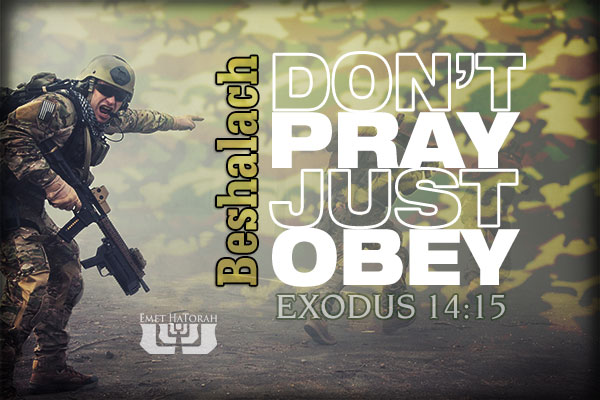Parashat Beshalach - Exodus 13:17-17:16
Series:

Don’t Pray. Just obey.
Aren’t we supposed to pray about everything? Shouldn’t we pray before doing anything? After all, Philippians 4:6 says, “Do not be anxious about anything, but in everything by prayer and supplication with thanksgiving let your requests be made known to God.” Why wouldn’t we pray about everything we do? This week’s parashah offers an interesting insight into a very good reason why prayer might not always be the best thing for our situation.
In the beginning of our Torah portion, the Children of Israel are faced with a dilemma. Pharaoh realized what a terrible loss he had incurred by allowing the Israelites to leave Egypt, and so he begins pursuing them with a massive army. When he and his army catch up with the Children of Israel, they are in a particularly strategic position: they have the Israelites cornered. There is no where to go but into the sea. The Torah records the reaction of the Israelites:
When Pharaoh drew near, the people of Israel lifted up their eyes, and behold, the Egyptians were marching after them, and they feared greatly. And the people of Israel cried out to the LORD. (Exodus 14:10)
The Children of Israel were trapped and they cried out to the LORD. And although the text isn’t explicit, it appears that Moses follows their lead because just a few verses later we read:
The LORD said to Moses, “Why do you cry to me? Tell the people of Israel to go forward. (Exodus 14:15)
What? Why does Hashem rebuke Moses because he prayed? Isn’t this a natural response, the response God desires? Doesn’t He want us to seek Him in times like these? Isn’t this the very purpose of prayer? Rabbi Yehudah recognized the problem most people would associate with this passage and therefore explained the situation:
At that time, Moses was prolonging his prayer. The Holy One, Blessed be He, said to him: My beloved ones are drowning in the sea and you prolong your prayer to me? Moses said before Him, “Master of the Universe, but what can I do?” God said to him, “Speak to the children of Israel that they go forward. And you, lift up your rod and stretch out your hand” [Exodus 14:15-16]. (Sotah 37a)
In other words, Moses doesn’t need to spend time praying about the situation, when he could be using that time doing what Hashem has already instructed him to. The Apostle John says something similar:
If anyone sees his brother committing a sin not leading to death, he shall ask, and God will give him life—to those who commit sins that do not lead to death. There is sin that leads to death; I do not say that one should pray for that. All wrongdoing is sin, but there is sin that does not lead to death. (1 John 5:16–17)
James, the brother of our Master extends this principle to our daily choices as well. He says, “So whoever knows the right thing to do and fails to do it, for him it is sin” (James 4:17). Some people who have followed Yeshua their entire lives still don’t understand this point. We don’t need to pray about the things God has already told us to do, particularly the things He has told us in His Word. If we are continually praying about what to do when God has already given us His instructions, then we are wasting both our time and His. So if you’re in a situation that requires action and the right response has already been give to you through the Scriptures or godly counsel … Don’t pray. Just obey.








